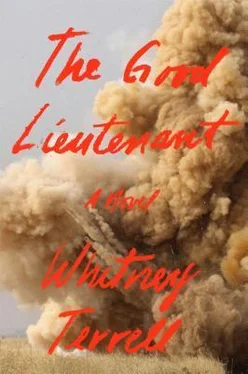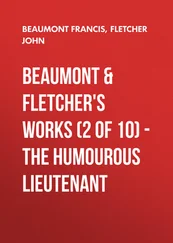About ten miles out of town, the truck trundled off onto a gravel road, unplowed, the double ruts of tire marks obscured by the smooth-faced slopes of drifted snow. She downshifted into four-wheel drive, then gunned the truck, cresting the first drift, Dykstra in the back shouting, “Yee-ohah!” in a Philadelphian imitation of a hillbilly yell. Fowler beat back a grin and thumbed her stocking cap down over her forehead, shoulders hunched with matching intensity, and for a moment he forgot the road, forgot his curiosity about the purpose of their errand, forgot the forbidding darkness of the fields outside the cab, forgot the radio, forgot even that they were moving, and instead watched her, downshifting, then upshifting, eager, certain, and surprisingly calm despite the violent shaking of the cab.
Behind them, three more vehicles pulled up, all of them civilian: a hulking black Suburban, from which Sergeant Waldorf descended, a white Ford F-150 with chrome pipes that belonged to Jimenez, and lastly Crawford’s car, which was a Honda CRV and looked like a toy compared with the rest. There was a brief blatting of bass that accompanied Crawford’s car as it chugged up uneasily, loud enough for Fowler to turn around and glance, but her expression wasn’t angry — Pulowski knew all her signals by then, even in the dark — more like ardent, even amused, and the music died as soon as the car shut off, and the rest of the platoon struck out after them through the field of snow, not exactly with murderous efficiency, since Pulowski could see Crawford and McWilliams horsing around together in the snow. But unified, at least.
There was a chain-link fence about a hundred yards across the field, and as they climbed the small berm that led up to it, Pulowski could see the watchtower tall enough that it had been fitted with red lights, to warn away small aircraft. Then, just beyond, banks of lights erected every quarter mile, shining down on rows of snow-covered tanks and Humvees, on flatbed trucks, and on the tents where every company commander in the battalion had stationed guard details to watch over their equipment as it waited to be loaded into the trains. The DRIF.
Dykstra was already kneeling, calmly cutting an opening into the links of chain. “Why in God’s name would we want to break in there?” Pulowski asked. In response, Dykstra tilted his heavy, cold-pinched face toward Fowler.
“We’ve got to borrow a couple of Captain Masterson’s things,” she said. Why? Pulowski wanted to know. Borrow what? Didn’t she know that this was totally illegal? Didn’t she know they had guards down there? What the hell was she thinking? Wasn’t the whole problem with her platoon that they didn’t have respect for the rules? Fowler squinted her eyes thoughtfully against the snow until Dykstra had finished cutting a seam in the fence, then lifted one corner with her gloved hand. “Beale’s getting smoked off-site by some of Masterson’s goofs,” she said. “He’s a dickwipe, but he’s my dickwipe, and it is my conviction my dickwipes don’t get punked like that. So we need some leverage, and you, Lieutenant, are here to be our guide. Besides, isn’t it your conviction that getting court-martialed now might not be such a bad thing?”
“Well, since you put it that way.” Pulowski shimmied through the opening, elbows pulling his body forward, the powder flaring up around his chin, and then they body-skied down the berm, sliding and falling, cushioned by the snow, so that the descent felt like an interesting mixture of something that was truly dangerous and something that was not. The DRIF resembled an immense city whose residents thought primarily of murder — or so Pulowski had described it to Fowler, largely to get her goat, but also because, in his opinion, it felt that way. Spooky as hell, especially if you tried to mentally put together the video he saw, say, on Lehrer , of the moment when an IED hit — the thoom sound of the tape, the way the camera always twisted and joggled with the report, and then the inky black column of smoke coiling up. And then you walked around the DRIF and saw about five hundred Humvees and wondered which one of them would be hit that way. But now it wasn’t scary. Not on this particular trip.
They huddled on the back edge of the lot, against a row of Bradleys, their armor fringed with icicles. Everybody hated the DRIF. Pulowski had worked several night shifts there, twelve hours in the command center, freezing his ass off in a poorly heated tent; in there, the DRIF was a giant algorithm, paperwork upon paperwork, lists of gear, every piece itemized, presented to him and then entered into the computer program that kept track of their logistics. But out here, in the actual open, alone with Fowler and her platoon, there was a perverse kind of freedom to it. Security was light. The forklifts weren’t running. Most of the officers had given themselves the night off, along with most of their underlings. The intruders rested, listening to the growl of generators and dusting off their pants, then Fowler peeked down one of the long central aisles, and said, “So, where does Delta Company keep their shit?”
Pulowski crept up and crouched beside her. Every so often, the lines of vehicles were broken by a passageway running perpendicular to the main aisle, and at each of these intersections — a solution that had been thought up a week into their time on the DRIF — was an orange cone that labeled the contents of that area. The next sign read HUMVEES. He fed this into his mind. He had a picture of the grid in there, the map of the whole DRIF, which hung in the command center and which, by now, he’d seen a thousand times. The key was to picture it clearly, as you might an equation. Somewhere out there was a long, snow-covered aisle with stacked containers filled with every company’s gear. He nodded when he had the location, pointed down the aisle ahead of them, then showed Fowler two fingers, and pointed to the left. Then Fowler stood and waved her platoon forward, repeating the sign that Pulowski had just made, and they all hustled down the snowy alley, Fowler charging out ahead.
* * *
“What in the world are you doing?” Pulowski asked.
Beale was holding a black trash bag and picking up beer cans from the side of an unplowed county road, twenty miles outside of Fort Riley and the DRIF. Beale’s nose had a clear drop of snot suspended from its end. “Policing the area,” he said.
“For whom? Why?”
“Orders.”
“Come on with the fucking orders, Beale. Where were you last night?”
Beale glanced back down the road. There was a plywood structure in the milo field there — a cross between a building and a Hollywood western set.
“You stayed here?”
Beale nodded. His nostrils were ice-crusted and he walked splay-footed through the roadside snow, his upper lip trembling.
“Well, that was fucking genius. How’d that go for you?”
“Loud,” Beale said.
“Really.”
“It was very loud.”
“That wasn’t the answer I was expecting.”
“Wolves,” Beale said. “Other things.”
“Wolves? I didn’t know they had wolves out here.” Pulowski scanned the open field. Cut corn stalks poked up through the snow.
“Oh, yeah, man. It’s fucking badass out here. These guys have seen a bunch of wolves. Bear. No fucking around. Band of brothers, man.”
“No lions?” Pulowski asked. “No tigers?”
“Fuck you,” Beale said.
There was a stir outside the plywood building, figures in ACUs, standing out checkered brown against the snow-cropped field. “No fucking help,” one of them shouted. The sound was shredded up by the wind that cut through Pulowski’s jacket, and he dug his hands into his pockets and reminded himself how little he liked the country, in any form. “Mouth, Beale. Get your mouth into it. Show us your mouth.”
Читать дальше












